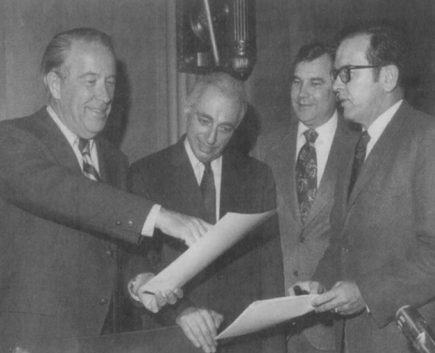In choosing to blame Islam for its own decline, Lewis was bucking the new paradigm through which the region was being seen: post-colonialism, which attributed the Middle East’s current problems to the colonial era. Lewis argues that imperialism—while certainly one of the roots of the problems that now plague the modern Middle East—hardly explains the region’s malaise. Those very problems brought colonialism to the region in the first place, he’s insisted: “Why did colonialism come to the Middle East? Because [the region] was relapsing into total backwardness.”
During Lewis’ seven decades as a scholar, the study of the Middle East changed dramatically. When he was a student and a young professor, Oriental studies—as it was then known—drew on European experiences of the Crusades, the Renaissance and the Enlightenment. Modern Middle Eastern studies departments didn’t come into existence until after World War II, when the U.S. began to place greater emphasis on studying the region due to its strategic significance. The government began to pour money into the field, and in 1958, as part of the National Defense Education Act, funded Title VI fellowships to support graduate students in what became known as “area studies.”
With the 1967 Arab-Israeli war, these programs became increasingly politicized. Lewis’ Israel sympathies set him apart early on, but were hardly the only thing that separated him from colleagues in the discipline. Many in these newly formed area studies departments focused on methodology and theory, whereas Lewis remained committed to the “objective” study of history—a notion that had come into question in the field.
In 1978 when Edward Said published Orientalism—a work that became a handbook for post-colonial theory—Bernard Lewis’ status in the field came under intense scrutiny for the first time in his career. In the book, Said posited that the study of the Middle East was yet another manifestation of imperialism and implicitly insists that the study of the east belongs to the people of the east. “Orientalists” (the term became a pejorative) like Bernard Lewis, he argues, barely conceal their disdain for their subject matter. At the core of Westerners’ study, Said claims, is a “subtle and persistent Eurocentric prejudice against Arabo-Islamic peoples and their culture.” He calls Lewis, his primary target, a “perfect exemplification” of an “Establishment Orientalist” whose work “purports to be objective liberal scholarship but is in reality very close to being propaganda against his subject material.”
Lewis responded in kind, publishing a screed against Orientalism in the New York Review of Books. He famously asserted, “If westerners cannot legitimately study the history of Africa or the Middle East, then only fish can study marine biology.” At the crux, Lewis tells me, is “the difference between scholarship and politics; they insist on seeing everything as politics and they see Orientalists as imperialists, which is absolute nonsense. The Orientalist scholarship in the western world began in the Middle Ages long before there was a question of French or British imperialism.”
Shortly before his death in 2003, Said attended a round table discussion organized by the Arabic weekly Al-Ahram in which he claimed that Bernard Lewis “hasn’t set foot in the Middle East, in the Arab world, for at least 40 years. He knows something about Turkey, I’m told, but he knows nothing about the Arab world.” Some 25 years had passed since the publication of Orientalism, but the rage—whether academic or otherwise—was still simmering, as raw then as decades before. Much of the debate took place on the pages of the New York Review of Books, but it also spilled over to conferences sponsored by the Middle East Studies Association (MESA), the reigning umbrella association of Middle East scholars founded in 1966, and which was eventually, in Lewis’ words, “taken over by Saidians.” Said and Lewis met only once, at a MESA conference, and their meeting was brief and uneventful, Lewis tells me.

